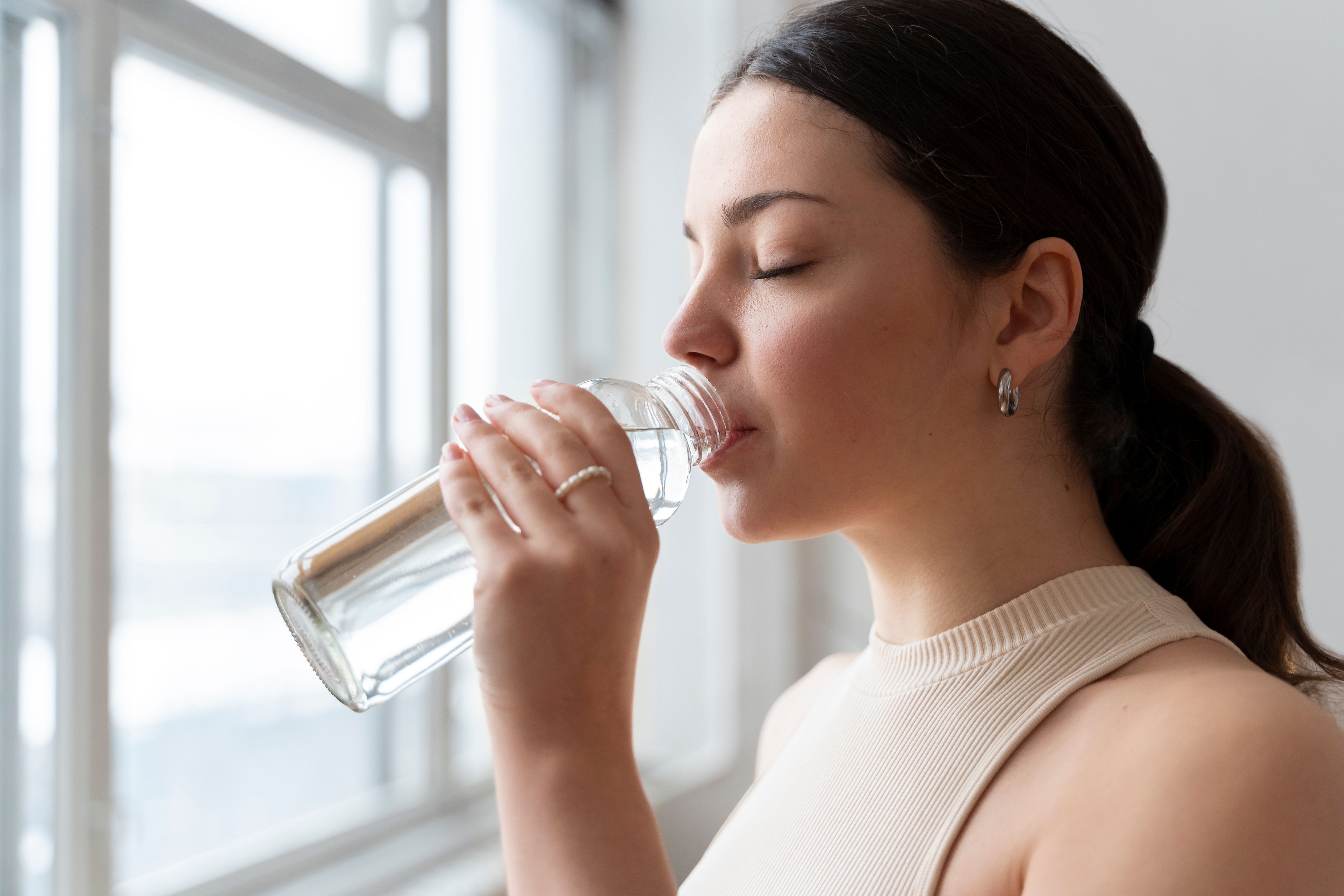November 3, 2025
Why Hydration Is Key to a Healthy Mouth

Key Points
- Your mouth produces 0.5 to 1.5 liters of saliva daily, but dehydration can reduce this flow by up to 60%, compromising oral health.
- Proper hydration helps maintain optimal saliva production, which neutralizes harmful acids and protects tooth enamel from decay.
- Dehydration increases the risk of cavities, gum disease, and chronic bad breath by creating an environment where harmful bacteria thrive.
- Drinking water throughout the day helps wash away food particles and bacteria that contribute to plaque buildup.
- Chronic dry mouth affects approximately 22% of the population and significantly increases the risk of dental problems.
- Staying hydrated supports the remineralization process that naturally repairs early tooth enamel damage.
- Silver State Smiles emphasizes preventive care, including proper hydration, as essential for long-term oral health.
Overview
Water is essential for life, but its importance for oral health is often underestimated. While most people understand that brushing and flossing are crucial for maintaining a healthy smile, the role of hydration in preventing dental problems deserves equal attention.
Your mouth is a complex ecosystem that relies on adequate moisture to function properly. Saliva, which is 99% water, serves as your mouth's first line of defense against decay, infection, and disease. When you become dehydrated, this protective system breaks down, leaving your teeth and gums vulnerable to a range of problems.
Silver State Smiles explores the critical connection between hydration and oral health, examining how proper water intake protects your smile and what happens when you don't drink enough fluids throughout the day.
1. The Critical Role of Saliva in Oral Health
Saliva is far more than just moisture in your mouth. It's a sophisticated biological fluid that performs multiple essential functions for maintaining oral health.
Your salivary glands produce between 0.5 and 1.5 liters of saliva each day under normal conditions. This fluid contains enzymes, minerals, proteins, and antibacterial compounds that work together to protect your teeth and gums. Saliva helps neutralize acids, repair tooth enamel, and fight bacteria that cause cavities and gum disease.
Essential Saliva Functions:
- Acid Neutralization: Buffers harmful acids produced by bacteria and acidic foods
- Remineralization: Delivers calcium and phosphate to repair weakened tooth enamel
- Bacterial Control: Contains antimicrobial agents that limit harmful bacterial growth
- Digestion Aid: Begins the digestive process and helps you swallow food comfortably
- Taste Enhancement: Dissolves food compounds so taste receptors can function properly
2. How Dehydration Damages Your Teeth and Gums
When you become dehydrated, saliva production decreases significantly, creating an environment where oral health problems can develop rapidly.
Reduced saliva flow allows acids to remain on tooth surfaces longer, accelerating enamel erosion and increasing cavity risk. Without adequate saliva to wash away food particles and bacteria, plaque accumulates more quickly on teeth and along the gumline.
Dehydration-Related Oral Problems
- Increased Cavity Risk: Acids attack enamel for longer periods without saliva's protective buffering
- Gum Disease Development: Bacteria multiply unchecked, leading to inflammation and infection
- Chronic Bad Breath: Bacterial overgrowth produces foul-smelling compounds
- Mouth Sores: Dry tissues become more susceptible to irritation and injury
- Difficulty Swallowing: Reduced lubrication makes eating uncomfortable and affects nutrition
3. Water vs. Other Beverages for Oral Health
Not all fluids provide equal benefits for your oral health. Understanding which beverages support or harm your teeth helps you make better hydration choices.
Plain water is the ideal beverage for oral health because it hydrates without introducing sugars, acids, or other compounds that can damage teeth. Fluoridated tap water provides the additional benefit of strengthening tooth enamel and preventing cavities, making it superior to bottled water in many cases.
Make water your primary beverage throughout the day. When consuming acidic or sugary drinks, do so with meals rather than sipping throughout the day. Rinse your mouth with water after drinking anything other than plain water. Wait 30 minutes after consuming acidic beverages before brushing to avoid damaging softened enamel.
4. Recognizing and Addressing Dry Mouth (Xerostomia)
Dry mouth, or xerostomia, is a condition characterized by reduced saliva production that affects approximately 22% of the population and can significantly compromise oral health.
Chronic dry mouth increases the risk of cavities, gum disease, and oral infections by eliminating saliva's protective effects. Many factors beyond simple dehydration can cause persistent dry mouth, including medications, medical conditions, and aging.
Common Dry Mouth Symptoms
- Sticky Feeling: Your mouth feels tacky or dry rather than comfortably moist
- Thick Saliva: What saliva you produce feels stringy or unusually thick
- Difficulty Swallowing: Food doesn't go down smoothly without extra liquid
- Bad Breath: Persistent unpleasant odor even after brushing and flossing
- Taste Changes: Foods don't taste as they normally do
- Oral Discomfort: Your tongue, cheeks, or throat feel irritated or sore
5. Hydration Strategies for Optimal Oral Health
Developing consistent hydration habits requires more than just knowing you should drink more water. Strategic approaches help you maintain adequate fluid intake throughout the day.
The amount of water you need varies based on factors including body size, activity level, climate, and overall health. While the common "eight glasses a day" guideline provides a reasonable baseline, your individual needs may be higher or lower.
Effective Hydration Strategies
- Morning Routine: Start your day with a glass of water before coffee or breakfast
- Meal Timing: Drink water with every meal and snack to aid digestion and rinse your mouth
- Visual Reminders: Keep water visible at your desk, in your car, and around your home
- Flavor Enhancement: Add fresh fruit slices or herbs if plain water seems boring
- Temperature Preference: Drink water at whatever temperature you find most appealing
- Pre-Activity Hydration: Drink extra water before exercise or outdoor activities
Increase water intake during hot weather, when exercising, during illness, and if you take medications that cause dry mouth. Monitor your urine color as a hydration indicator. Pale yellow suggests adequate hydration, while dark yellow indicates you need more fluids.
Professional Dental Care and Hydration Support
While proper hydration is something you control at home, professional dental care provides essential monitoring and intervention when hydration-related oral health problems develop.
Silver State Smiles offers comprehensive preventive care that includes assessing your oral hydration status, identifying dry mouth causes, and recommending personalized strategies to protect your smile.
Measuring Your Hydration Success
Track these indicators to ensure you're maintaining adequate hydration for oral health:
- Saliva Comfort: Your mouth feels comfortably moist throughout the day
- Urine Color: Consistently pale yellow rather than dark or concentrated
- Oral Health Stability: No increase in cavities, gum problems, or bad breath
- Eating Comfort: No difficulty chewing or swallowing dry foods
- Fresh Breath: Minimal morning breath that resolves quickly after brushing
- Taste Function: Foods taste normal and enjoyable
Regular dental checkups at Silver State Smiles help monitor these factors and catch potential problems early.
Conclusion
Hydration is a simple yet powerful tool for maintaining excellent oral health. By supporting saliva production, you enable your mouth's natural defense systems to protect your teeth and gums from decay, disease, and discomfort.
The connection between hydration and oral health extends beyond just drinking water. It encompasses beverage choices, food selection, medication awareness, and recognition of medical conditions that affect moisture levels in your mouth.
Making hydration a priority doesn't require dramatic lifestyle changes. Small, consistent habits like keeping water accessible, sipping throughout the day, and choosing water over sugary drinks create meaningful protection for your smile.
Remember that while proper hydration provides essential support for oral health, it works best as part of a comprehensive dental care routine. Combine adequate water intake with regular brushing, daily flossing, and professional dental care from Silver State Smiles for optimal results.
Your mouth works hard every day, and it deserves the hydration needed to function at its best. Start today by pouring yourself a glass of water and committing to keeping your smile healthy, comfortable, and well-hydrated for years to come.

Schedule Your Visit Today
Experience exceptional dental care in a comfortable, state-of-the-art environment. New patients welcome!
